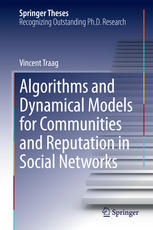

Most ebook files are in PDF format, so you can easily read them using various software such as Foxit Reader or directly on the Google Chrome browser.
Some ebook files are released by publishers in other formats such as .awz, .mobi, .epub, .fb2, etc. You may need to install specific software to read these formats on mobile/PC, such as Calibre.
Please read the tutorial at this link: https://ebookbell.com/faq
We offer FREE conversion to the popular formats you request; however, this may take some time. Therefore, right after payment, please email us, and we will try to provide the service as quickly as possible.
For some exceptional file formats or broken links (if any), please refrain from opening any disputes. Instead, email us first, and we will try to assist within a maximum of 6 hours.
EbookBell Team

4.8
74 reviewsA persistent problem when finding communities in large complex networks is the so-called resolution limit. This thesis addresses this issue meticulously, and introduces the important notion of resolution-limit-free. Remarkably, only few methods possess this desirable property, and this thesis puts forward one such method. Moreover, it discusses how to assess whether communities can occur by chance or not. One aspect that is often ignored in this field is treated here: links can also be negative, as in war or conflict. Besides how to incorporate this in community detection, it also examines the dynamics of such negative links, inspired by a sociological theory known as social balance. This has intriguing connections to the evolution of cooperation, suggesting that for cooperation to emerge, groups often split in two opposing factions. In addition to these theoretical contributions, the thesis also contains an empirical analysis of the effect of trading communities on international conflict, and how communities form in a citation network with positive and negative links.